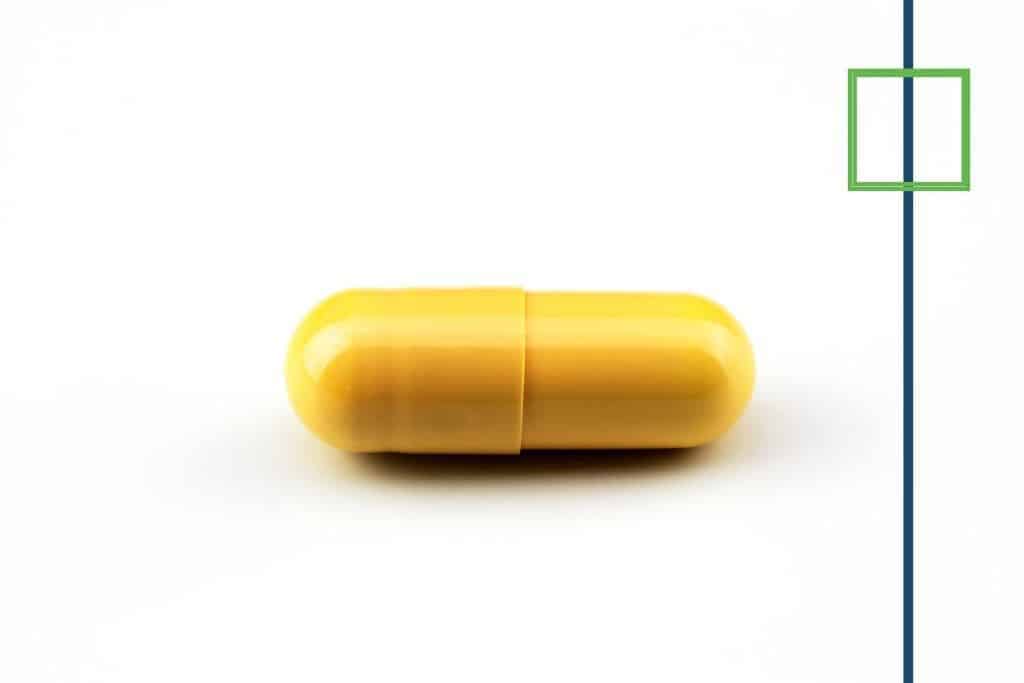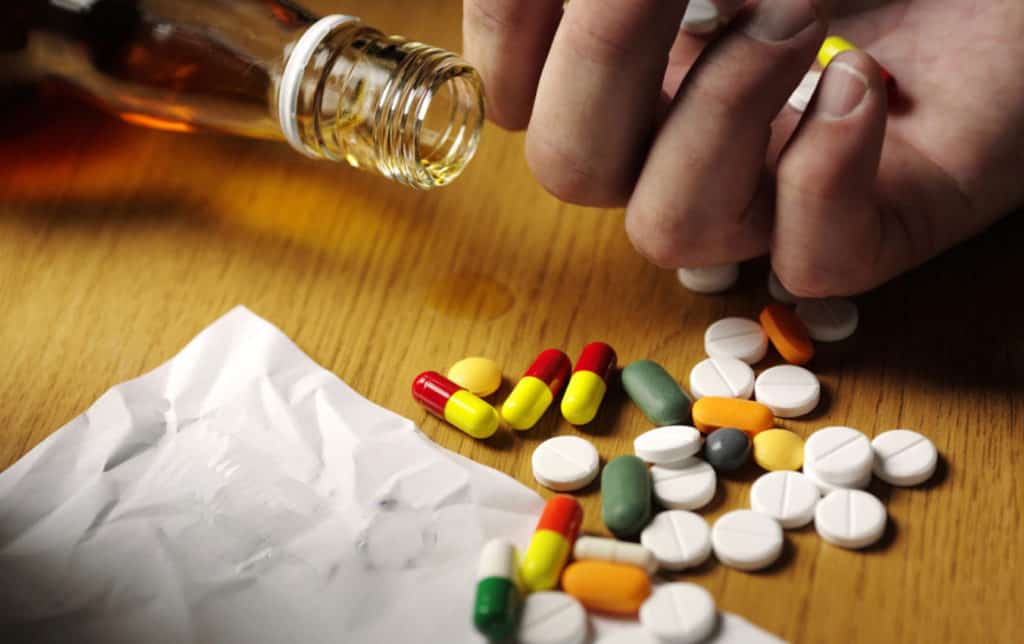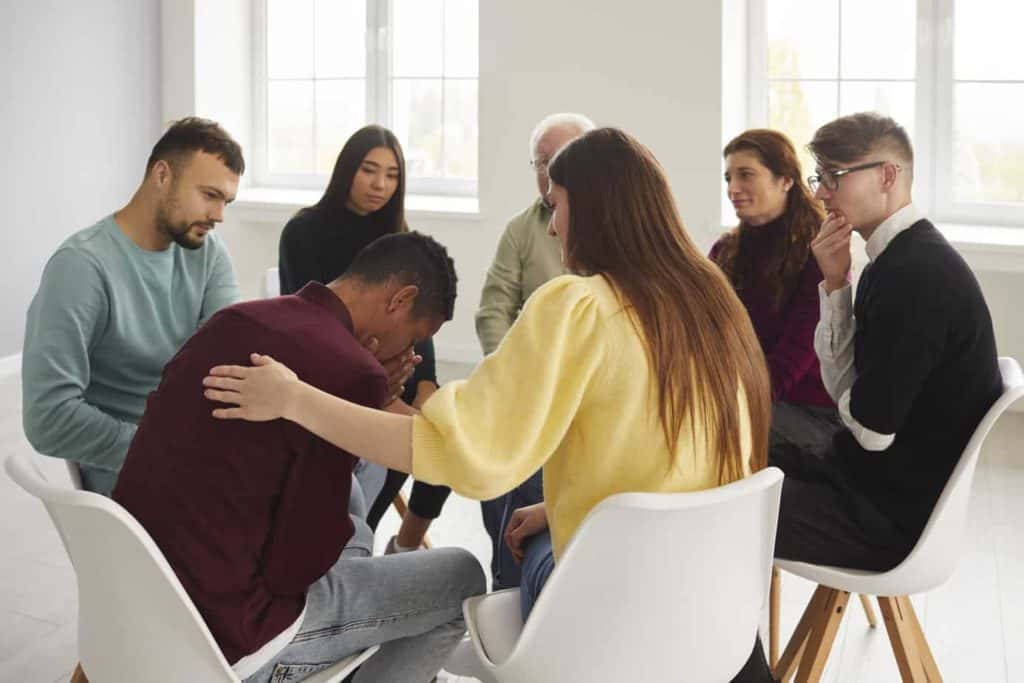What is DXM?
Dextromethorphan or more commonly known as a DXM is an over-the-counter (OTC) cough and cold medication. DXM is from a derivative of morphine, a very powerful opioid, but is not technically an opioid. Due to the effects it can have, it behaves like an opioid without the painkilling effects. It is effective at suppressing the average cough and creates some sedation which can help sick individuals relax or fall asleep. Unfortunately, when taken in much higher doses, DXM sometimes causes individuals to experience a euphoric high which is then sought after.
According to the Drug Enforcement Agency (DEA), DXM is an antitussive (a type of medication used to stop a cough) found in over 120 cold medications (such as Vicks 44, NyQuil, and Robitussin). The typical dosage is 15-30mg taken 3-4 times a day. When abused, however, individuals can end up taking 100-1500mg a day. The DEA provides a ranking of “plateaus” which describes how users can manipulate different doses to achieve different effects.
- 100-200mg → Mild stimulation
- 200-400mg → Euphoria and hallucinations
- 300-600mg → Distorted visual perceptions, loss of motor coordination
- 500-1500mg → Dissociative sedation

The DEA will schedule certain drugs it deems to be dangerous and hazardous to the public’s health under its classification system. For example, Methamphetamine is considered a schedule 1 drug and therefore is very dangerous. DXM is not classified under this system. It is typically found in liquid form but illicit websites and users have begun selling the drug in capsule or powder form.

Get Your Life Back
Find Hope & Recovery. Get Safe Comfortable Detox, Addiction Rehab & Dual Diagnosis High-Quality Care.
Hotline(844) 597-1011What is DXM Used For?
Dextromethorphan is used to relieve coughs due to colds or influenza (flu). It should not be used for chronic cough that occurs with smoking, asthma, or emphysema or when there is an unusually large amount of mucus or phlegm (flem) with the cough.
Dextromethorphan relieves cough by acting directly on the cough center in the brain. This medicine is available without a prescription. Do not give any over-the-counter (OTC) cough and cold medicine to a baby or child under 4 years of age. Using these medicines in very young children might cause serious or possibly life-threatening side effects.
This product is available in the following dosage forms:
- Suspension, Extended Release
- Solution
- Tablet
- Liquid
- Capsule, Liquid Filled
- Elixir
- Syrup
Get Help. Get Better. Get Your Life Back.
Searching for Accredited Drug and Alcohol Rehab Centers Near You?
Even if you have failed previously and relapsed, or are in the middle of a difficult crisis, we stand ready to support you. Our trusted behavioral health specialists will not give up on you. When you feel ready or just want someone to speak to about therapy alternatives to change your life call us. Even if we cannot assist you, we will lead you to wherever you can get support. There is no obligation. Call our hotline today.
(844) 597-1011What is Kratom?
Kratom is a tropical tree (Mitragyna speciosa) native to Southeast Asia, with leaves that contain compounds that can have psychotropic (mind-altering) effects. It is not currently an illegal substance and people suffering from Kratom Drug Addiction can easily order it on the internet. It is sometimes sold as a green powder in packets labeled “not for human consumption.” It is also sometimes sold as an extract or gum, states the National Institute on Drug Abuse in the piece ‘Kratom DrugFacts’.
Most people take kratom as a pill, capsule, or extract. Some people chew kratom leaves or brew the dried or powdered leaves as tea. Sometimes the leaves are smoked or eaten in food.
Kratom can cause effects similar to both opioids and stimulants. Two compounds in kratom leaves (mitragynine and 7-α-hydroxy mitragynine) interact with opioid receptors in the brain, producing sedation, pleasure, and decreased pain, especially when users consume large amounts of the plant. Mitragynine also interacts with other receptor systems in the brain to produce stimulant effects. When kratom is taken in small amounts, users report increased energy, sociability, and alertness instead of sedation. However, kratom can also cause uncomfortable and sometimes dangerous side effects.
Kratom abuse appears to be on the rise in the United States, as the Journal of Addictive Diseases reports on increased poison control center calls. In America, kratom is often marketed as a nutritional or dietary supplement. Negative reactions to the toxicity of the drug prompted the U.S. Food and Drug Administration (FDA) to ban its import in 2014. The Drug Enforcement Administration (DEA) lists kratom as a “drug of concern” in the United States.
What is Kratom Used For?
In low doses, kratom has a stimulant effect, resulting in increased energy, talkativeness, and less need for sleep. Higher doses of kratom are said to have an effect similar to morphine, the New York State Office of Alcoholism and Substance Abuse Services (NY OASAS) reports, by working on opioid receptors and some of the brain’s chemical messengers related to emotional regulation and pleasure.
DXM And Kratom
DXM and Kratom compete for the same metabolic pathway and will therefore interact when used together. Chemically speaking, DXM is an opioid, but it does not act on the body’s opiate receptors. Kratom, on the other hand, isn’t an opioid, and yet it interacts meaningfully with the opioid receptors in the central nervous system.
In terms of their effects, kratom and DXM are neutral to each other. Kratom’s psychoactive effects are not in any way disturbed by DXM, nor are DXM’s anti-cough properties affected by kratom. Nevertheless, there is a cause for concern in terms of how they are metabolized by the body.
DXM is mainly metabolized by two cytochrome P450 enzymes: CYP2D6 and CYP3A4. Incidentally, kratom has a strong inhibitory effect on both these enzymes. This means that kratom consumption can lead to an increased presence of DXM and its metabolites within the body.

First-class Facilities & Amenities
World-class High-Quality Addiction & Mental Health Rehabilitation Treatment
Rehab Centers TourRenowned Addiction Centers. Serene Private Facilities. Inpatient rehab programs vary.
Addiction Helpline(844) 597-1011Proven recovery success experience, backed by a Team w/ History of:
15+
Years of Unified Experience
100s
5-Star Reviews Across Our Centers
10K
Recovery Success Stories Across Our Network
- Low Patient to Therapist Ratio
- Onsite Medical Detox Center
- Comprehensive Dual-Diagnosis Treatment
- Complimentary Family & Alumni Programs
- Coaching, Recovery & Personal Development Events
DXM And Kratom Dangerous
As we’ve seen, kratom has inhibitory effects on the metabolization of DXM. But is this an issue? The reality is this: if you’re taking DXM responsibly and using the proper dosage, then it’s unlikely to lead to any noticeable side effects in combination with kratom. DXM is not meant to be used for long periods. Additionally, incredibly large amounts of DXM need to be consumed to cause immediate adverse effects.
If you have a condition that forces you to take DXM regularly (remember: it is present in many medications), then you might want to be careful about mixing it with kratom. Lastly, studies have identified that a significant portion of the population has CYP2D6 deficiencies, which means they have trouble metabolizing compounds with the CYP2D6 enzyme. If you are a part of this cohort, mixing kratom and DXM is slightly riskier.
DXM And Kratom Interaction
It is possible to abuse both DXM and kratom to provide a sedative effect on the mind and body. While DXM may do a better job at this than kratom, mixing the two substances can greatly enhance the suppression effects. If taken at the same time, bodily function and critical organs may slow down to a dangerously low point, putting the user at risk of an overdose. The use of Naloxone has been proven to work against a patient overdosing on DXM and may save their life.
Polysubstance Abuse
Polydrug use involves the consumption of more than one drug at once. Although polysubstance abuse often refers to the abuse of multiple illicit drugs, it’s also inclusive of prescription medications used in nonmedical circumstances.
In some instances, those on prescription medication may unintentionally combine substances. They may have a few glasses of wine without realizing that their prescription medication should not be mixed with alcohol, or they may be on multiple prescriptions from different doctors, not realizing that these medications interact negatively with one another. As a result, individuals should always inform every doctor of every medication they are taking and confirm that medications don’t interact negatively with each other or alcohol before beginning a new prescription.
Other people intentionally engage in polysubstance abuse to experience greater effects from multiple substances. Oftentimes, users may have a preferred substance of abuse that they then combine with other substances at times to enhance the primary substance’s effects. For example, those who regularly abuse opioid drugs, like heroin or prescription painkillers, may sometimes take them with benzodiazepines to experience even greater relaxation or sedative effects.
While the combination of certain substances can certainly enhance desired effects of the drugs, polysubstance abuse also enhances the potential negative effects of each drug. According to the University of Michigan, mixing drugs can also bring unpredictable consequences; this means that those who engage in polysubstance abuse cannot predict the array and severity of negative consequences that could result.
World-class, Accredited, 5-Star Reviewed, Effective Addiction & Mental Health Programs. Complete Behavioral Health Inpatient Rehab, Detox plus Co-occuring Disorders Therapy.
CALL(844) 597-1011End the Addiction Pain. End the Emotional Rollercoaster. Get Your Life Back. Start Drug, Alcohol & Dual Diagnosis Mental Health Treatment Now. Get Free No-obligation Guidance by Substance Abuse Specialists Who Understand Addiction & Mental Health Recovery & Know How to Help.
Addiction Treatment
Treatment begins once detox ends. The goal of treatment is to help you lead a healthy, drug-free life. Treatment may also address related health conditions, such as depression or anxiety. There are numerous treatment options available. Most of the time, people use more than one. Common treatments for drug addiction include therapy sessions and medications.
Therapy
Therapy is conducted by a psychiatrist, psychologist, or addictions counselor. You can do it on your own, with your family, or in a group. There are many different types of therapy. Behavioral therapy refers to all forms of therapy aimed at helping you identify and change self-destructive attitudes and behaviors, particularly those that lead to drug use. A therapist can work with you to help you cope with cravings, avoid drugs, and prevent relapse.
Therapy can be intensive during the first weeks and months of treatment. Later, you might transition to seeing a therapist on a less frequent basis.

Medication
Research has yet to identify the best medications for kratom addiction. Dihydrocodeine and lofexidine (Lucemyra) are typically used to treat opioid withdrawal. They’ve also been used to treat kratom withdrawal.
The European Monitoring Center for Drugs and Drug Addiction (EMCDDA) suggests that treatment for kratom withdrawal and addiction can also include nonsteroidal anti-inflammatory drugs (NSAIDs), antidepressants, and anti-anxiety drugs.
Reclaim Your Life From DXM And Kratom
It is possible to abuse both DXM and kratom to provide a sedative effect on the mind and body. While DXM may do a better job at this than kratom, mixing the two substances can greatly enhance the suppression effects. We Level Up rehab treatment & detox center can provide you, or someone you love, the tools to recover from addiction with professional and safe treatment. Feel free to call us to speak with one of our counselors. We can inform you about this condition by giving you relevant information. Our specialists know what you are going through. Please know that each call is private and confidential.
Experience Transformative Recovery at We Level Up Treatment Centers.
See our authentic success stories. Get inspired. Get the help you deserve.
Start a New Life
Begin with a free call to an addiction & behavioral health treatment advisor. Learn more about our dual-diagnosis programs. The We Level Up Treatment Center Network delivers recovery programs that vary by each treatment facility. Call to learn more.
- Personalized Care
- Caring Accountable Staff
- World-class Amenities
- Licensed & Accredited
- Renowned w/ 100s 5-Star Reviews
We’ll Call You
Sources
[1] ‘Kratom DrugFacts’ – National Institute on Drug Abuse (www.drugabuse.gov)
[2] New York State Office of Alcoholism and Substance Abuse Services (NY OASAS) – (Oasas.ny.gov)
[3] Journal of Addictive Diseases
[4] The Drug Enforcement Administration (DEA) – (Dea.gov/)
[5] Kratom Addiction Treatment – We Level Up NJ Rehab Detox Center


